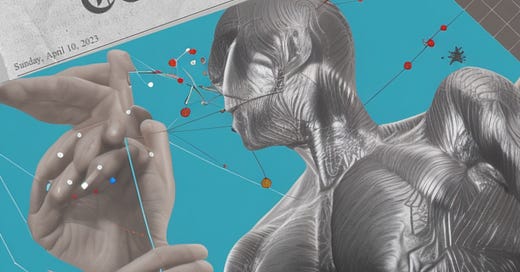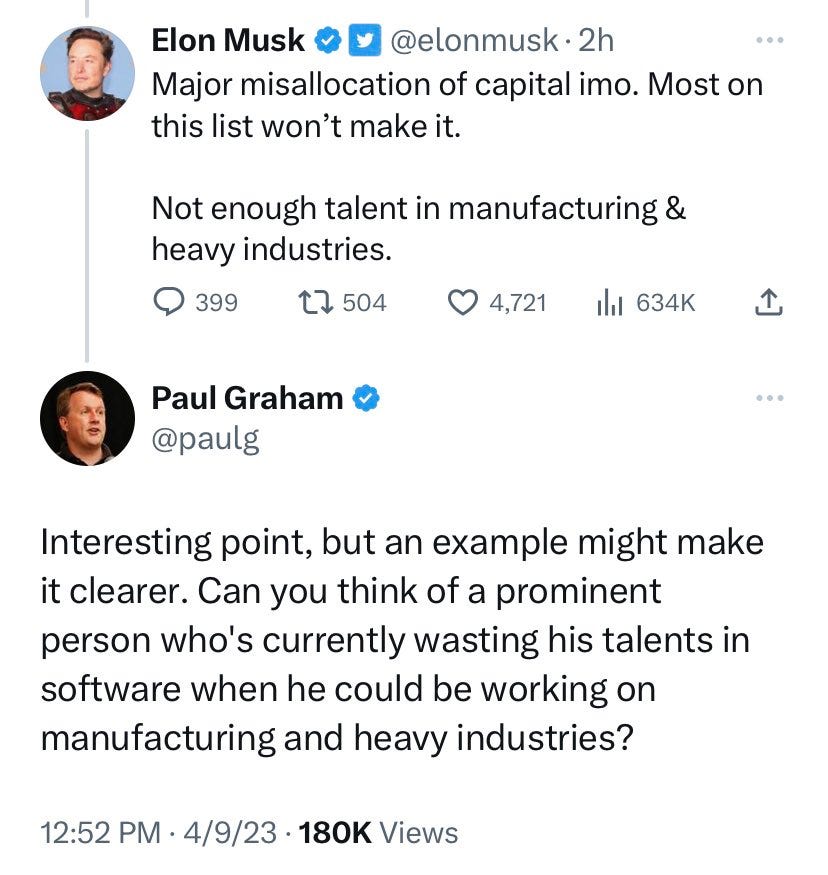valueless papers,how to become an olympic medallist & tweets about Elon
CC#58 - people dying from nutritional misinformation, a joke about AI safety & U.S. defense spending
Hey there and welcome to ✨ CuratedCuriosity - a bi-weekly newsletter delivering inspiration from all over the internet to the notoriously curious.
Things I Enjoyed Reading.
How do you become an olympic medallist? Swedish ice skater Nils van der Poel wrote down how he trains - fascinating insight into the daily life of someone who has optimized his whole life to achieve one, specific goal.
Some pro athletes say that, since they are professionals and can train as much as they like, they might as well add some weight training, and some stretching, and some core, and some technical sessions, and some training competitions, and some coordination sessions... All training sessions are performed at the expense of other, more efficient, training sessions, or at the expense of recovery after these sessions. My point isn’t that stretching is useless. If you need to stretch then go ahead and bend over. But do not fool yourself; do not drop hours from the essential sessions in order to perform something that sounds cool or is easy. Yeah, the gym is warm and nice, mirrors everywhere so that you can see your pretty face and attractive muscles. But you're more likely 50 watts of the required bike threshold to make it below 12.00,00, than you are 50kg in squats from it.
🍔 Read This, Not That: The Hidden Cost of Nutrition Misinformation
This is another article from Asterisk’s current food edition - this time on nutritional misinformation. Interesting discussion on where we get our information from on what (not) to eat. Includes an attempt to estimate how many people die U.S. due to nutritional misinformation.
Let’s follow the path of a research finding as it winds its way from a scientific journal article to the public. In September 2022, the European Journal of Preventive Cardiology published a study reporting that British adults who drink two to three cups of coffee per day are at a lower risk of developing cardiovascular disease and dying than those who don’t drink coffee. Although it’s tempting to conclude that coffee is good for the heart and keeps us from dying, this is an observational study and it’s not clear that the association is due to the coffee itself, rather than some other difference between people who drink a lot of coffee versus people who don’t.
The authors of the paper are fairly cautious in their interpretation; they describe the finding as an association and only obliquely imply that drinking coffee reduces health risks. 5 The academic press release is similarly judicious, although it puts more emphasis on the less cautious statements in the paper. By the time we get to the CNN Health article, the shackles of restraint have been cast off. “Coffee lowers risk of heart problems and early death,” the headline proclaims. The article spends two sentences acknowledging that the findings don’t necessarily imply cause and effect, then proceeds as if they do.
🧑🔬Spencer Greenberg on stopping valueless papers from getting into top journals [🎧]
Super interesting ideas regarding two fairly unrelated topics: (1) changing the incentives in science to give researchers more reasons to care about replicability and (2) interventions that make people more likely to stick to their habits.
In this wide-ranging conversation, Rob and Spencer discuss the above as well as:
• When you should and shouldn't use intuition to make decisions.
• How to properly model why some people succeed more than others.
• The difference between “Soldier Altruists” and “Scout Altruists.”
• A paper that tested dozens of methods for forming the habit of going to the gym, why Spencer thinks it was presented in a very misleading way, and what it really found.
• Whether a 15-minute intervention could make people more likely to sustain a new habit two months later.
• The most common way for groups with good intentions to turn bad and cause harm.
• And Spencer's approach to a fulfilling life and doing good, which he calls “Valuism.”
Food for Thought.
😮 This seems like quite an insane gap.
💊 Some good news for once. Narcan - a drug that can reverse the overdoses of opioids, including heroin and fentanyl - just got approved by the U.S. drug administration.
🪖 How much do individual countries actual spend on defense? Really makes one think where all this (U.S.) money flows to…

Random Stuff.
🗣️ Nature writing about an article published in Nature that examined how Nature’s political endorsement of Biden during the 2020 election campaign affected people’s view of the candidates (seems like it did not effect it) and their confidence in Nature and scientists generally (seems like it negatively affected it).

🐦 Wanted to include a tweet about a tweet on Elon Musk but unfortunately the Twitter API to Substack is currently not working due to… well I guess Elon Musk?
So here comes the screenshot and to give credit - I found this via @asv141.
🤖 A slightly humoristic take (I think sometimes this is needed) on the ongoing discussion about whether AI will potentially destroy us all in the near future.
Personal Update.
Currently living through COVID edition #2 (which is also why this newsletter is slightly delayed). But already feeling lots better.
Had a great time in Austria, meeting old friends and family - soonish heading back to CPH
Hopefully will have some interesting news to share in the next edition ;)






!['Will [ ] allow us to better understand each other and thus make war undesirable?' is one that pops up whenever we invent a new communication medium. Simple Answers](https://substackcdn.com/image/fetch/$s_!i-9K!,w_1456,c_limit,f_auto,q_auto:good,fl_progressive:steep/https%3A%2F%2Fsubstack-post-media.s3.amazonaws.com%2Fpublic%2Fimages%2Feb421ad2-37ab-4ec0-843a-82f1b992164d_456x556.png)